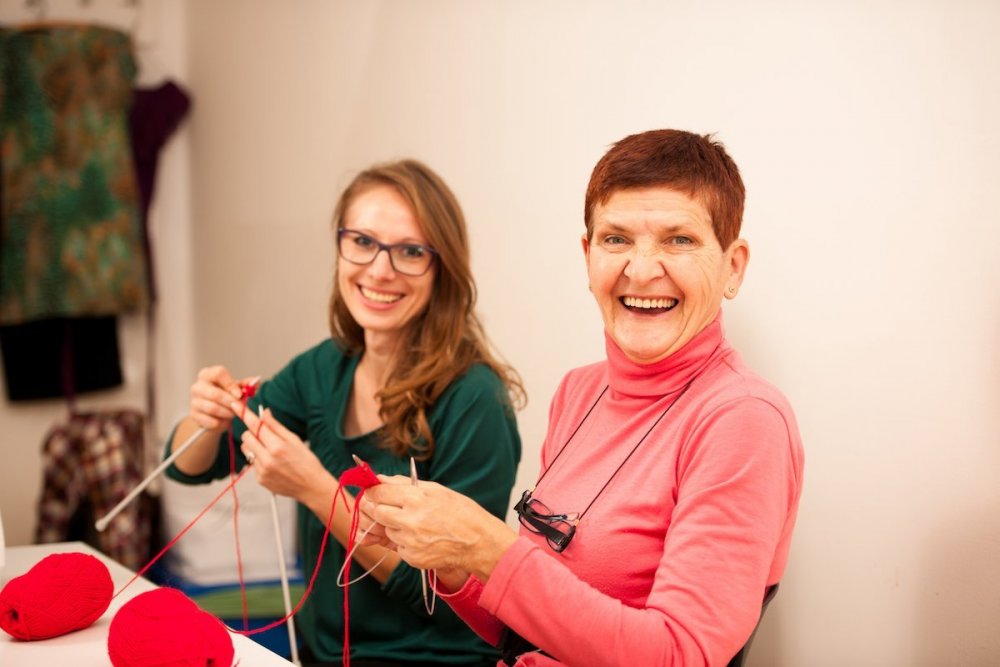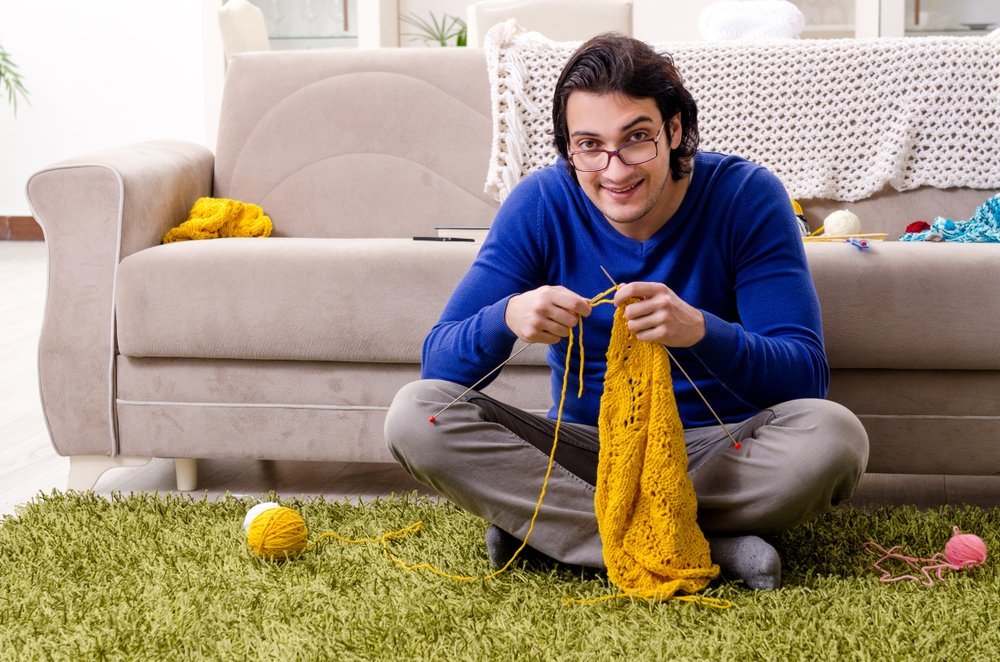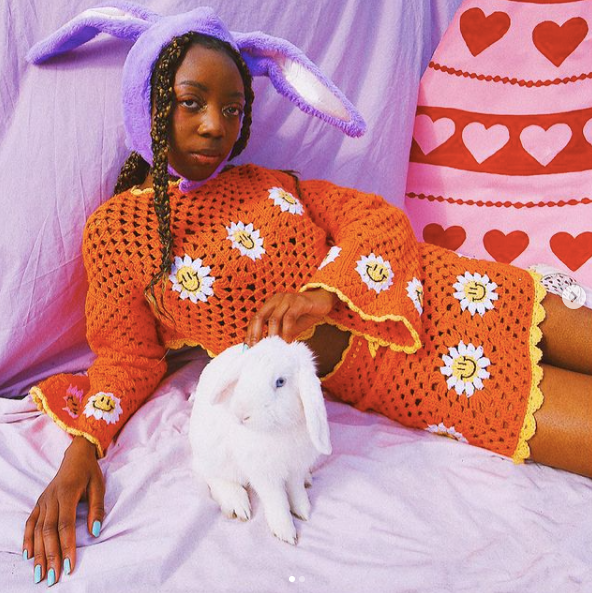After being pictured knitting at the Olympics, champion diver Tom Daley put crochet and yarn back in the public eye. Keen knitter Dee Marques looks at the health benefits of this popular pastime – from reducing anxiety to improving cognitive function.
Two years ago, I was browsing a crafts store website when something caught my eye. All I saw was a beautifully vibrant teal colour, and then I realised it was yarn. I really wanted to have that colour in my life, so I thought that if that meant learning to knit, so be it! I ordered the yarn, found some YouTube tutorials, and haven’t stopped knitting since.
In fact, it turns out that my experience of falling in love with yarn and knitting is quite common. Indeed, knitting is going through quite a revival, with people of all ages turning to the craft and discovering the benefits it brings to their mental health. Let's look at why this traditional skill is so popular again and at some of the interesting health advantages knitting can bring you.
Knitting: how it became hip
When people think about knitting, they usually picture an old lady sitting in a rocking chair and making a pair of thick and furry socks! Well, although old ladies do, of course, still knit, this old-fashioned stereotype is gradually being replaced by a new reality: knitting is no longer just a 'housewifey' thing to do.
The health benefits of knitting include reducing stress and anxiety
Indeed, knitting is fast-shedding its fuddy-duddy image. Over the past few years it's gone from being seen as something traditional to something radical. Now, knitting is no longer associated with domesticity, but rather with a creative activity for men and women of all ages.
For example, Facebook is full of knitting groups for guys, such as Men Who Knit. And the list of celebrities who are into knitting includes Russell Crowe, Christina Hendricks, and, more recently, Olympic bronze medallist Tom Daley – you may have spotted him in the crowd recently darning away during a swimming competition.
“Knitting is going through a revival, and people of all ages are turning to the craft and falling in love with it – and the benefits it brings to their health.”
A quick online search reveals lots of knitting clubs, as well as an endless Instagram feed where people from all over the world show off their skills and new creations. Some designers have started featuring incredibly creative knit garments that show how knitting is a match for unconventional personalities.

Diver Tom Daley and one of his creations Instagram/madewithlovebytomdaley
Furthermore, knitting has experienced a huge surge in popularity since the start of the pandemic. As millions of us found ourselves stuck at home with nothing to do due to lockdowns, knitting became a great way to learn a new skill and pass the time while doing something both creative and productive. In fact, during the past 18 months knitting stores have experienced a massive increase in sales and a surge in social media followers!
Practical advantages of knitting
So, before getting into the health benefits of knitting, here are some other reasons why it's such a cool hobby to indulge in:
-
It’s affordable. You can get started with just a few knitting needles, yarn, and a couple of stoppers. If you don’t want to buy them new, charity shops have tons of knitting goodies at low prices. In fact, I was able to get started by spending just £5! I found a few used needles at a second-hand store, and a neighbour gave me her kit, which she didn’t use anymore due to arthritis.
-
You can knit at home – and everywhere else you want. I made myself a pouch for my knitting tools and I make sure to always have it in my bag. That way, I can make progress on whatever I’m working on when I’m waiting at the GP surgery or at any other place where I know I have a long wait ahead of me.
-
You don't need much space. When you start knitting, you’ll need to follow patterns. Unlike sewing patterns, which can be huge and take up a lot of space, knitting patterns can be easily downloaded from websites and they barely cover more than an A4-sized piece of paper. There are plenty of free patterns, too.
-
Knitting is useful. Fancy a pair of fingerless gloves in your favourite colour? You can make them in one day. Want to make someone a handmade gift? Then knit a scarf, a beanie, or a wash cloth. When it comes to the practical side of knitting, nothing beats knowing that you can make your own clothes and accessories.
-
The knitting community is friendly and supportive. Everyone knows what it’s like to be a beginner and the community if full of people offering help and support to newbies.
Six key health benefits of knitting
The health benefits of knitting are mostly linked to mental health. But since mind and body are closely connected, the health benefits of knitting could also extend to physical well-being. Here are six potential advantages:
1. Reduced stress and anxiety
This is one of the greatest health benefits of knitting and the first to be noticed. Once you get 'in the flow' (and you will know when this happens!), knitting grabs all your attention and you become so absorbed in working row after row, that it takes your mind away from other worries. For me, knitting is synonymous with serenity, reducing both my anxiety and stress.
2. Improved cognitive function
At first sight, it may seem that knitting is a simple and repetitive activity. But alternating your knit and purl stitches stimulates brain function. Studies carried out in older adults have shown that this type of productive mental engagement can benefit cognitive skills, including memory and reasoning.
Linked to this, some research suggests that the cognitive demands of knitting can also reduce the risk of developing Alzheimer’s and dementia, as it keeps the brain cells fired up.

More men than ever are discovering the health benefits of knitting shutterstock/Elmur
3. Improved self-confidence
Knitting means creating something, and it’s empowering to go from being a consumer to being a producer. This gives knitters a boost of confidence and a feeling of accomplishment when seeing their work progress. Indeed, there’s a feeling of fulfilment involved in being able to wear or use what you made – doing something with your hands has healing power!
And while we all know clinical depression requires professional support, studies have shown that knitting has can take negative thoughts off the mind and release serotonin, which helps fight depressive states.
4. A lesson in mindfulness
Knitting requires focus and concentration in the present, one stitch at the time. This craft has been called 'the new yoga', since every knitting session is a great opportunity to disconnect from the outside world, slow down, and focus. Does this sound familiar? Yes, it’s similar to mindfulness, and so the health benefits of knitting are linked.
“Studies have shown that knitting can take negative thoughts off the mind and release serotonin, which helps fight depressive states.”
In fact, some people compare knitting to meditation and have even coined a new term for it: medknitation. Instead of repeating a mantra or focusing on their breathing, some knitters concentrate on the repetitive flow of knitting and are able to achieve a similar meditative state.
The teacher of happiness.com's MBSR course, Tine Steiss, is an avid knitter and keen proponent of the hobby due to its many benefits: "Knitting keeps my hands busy and this is beneficial in two situations: I can listen more deeply, be it in a meeting, in a conversation or with an audio book or podcast. I don't then reach for my mobile phone, a snack, or some other form of distraction.
RELATED: How to Practise Niksen – the Art of Doing Nothing
“But knitting also helps me relax, or in other words, it's an excuse to relax. When my hands are busy, the brain no longer searches for things that need to be done. Unlike mindfulness meditation, where I'm actively exercising the brain in a form of focused stillness, when I'm knitting, the brain is casually chilling on the couch.”

Happy knits from designer Lizzie Kaya Instagram/gimme_kaya
5. It boosts dopamine and a feel-good effect
Knitting can be frustrating when you’re a beginner. It took me a while to figure out how to undo mistakes, and until that happened, I was annoyed every time I got a stitch wrong. But it’s also incredibly rewarding.
Seeing the progress of your work, gaining self-confidence, and being relaxed are all states that trigger dopamine. This substance is known as the feel-good hormone, and it has a beneficial effect on body and mind. The release of dopamine can help regulate mood, sleep, digestion, blood flow, and many other important functions that contribute to the fabulous health benefits of knitting.
RELATED: Happiness Hormones – the Neurochemicals of Happiness
6. A sense of control
Most of us have felt things getting out of control over the past year or so. Instead of dwelling on the negative state of things, choosing to spend time doing something over which you do have control can help improve your well-being.
Start with an easy project so that you can experience that wonderful feeling of being in control of what can be controlled. To sum up, knitting is another coping tool you can add to your arsenal. Emotional well-being is one of the health benefits of knitting that everyone should experience.
The takeaway: why knitting benefits your health
The therapeutic effects of knitting range from reduced stress to better cognitive functioning, self-confidence, and the ability to focus on the present moment. You can experience the health benefits of knitting whether your knit alone or as part of a group. It doesn’t take much to get started, and once you get hooked, you’ll never look back! ●
Main image: shutterstock/Samo Trebizan
Are you a keen knitter? What health benefits does it give you? Share your thoughts and designs with the happiness.com community in the comments below...
happiness.com | The fine art of being: learn, practice, share
Are you a happiness.com member? Sign up for free now to enjoy:
■ our happiness magazine with practical life tips
■ share and support others in our happiness forum
■ self-develop with free online classes in our happiness Academy
Written by Dee Marques
 A social sciences graduate with a keen interest in languages, communication, and personal development strategies. Dee loves exercising, being out in nature, and discovering warm and sunny places where she can escape the winter.
A social sciences graduate with a keen interest in languages, communication, and personal development strategies. Dee loves exercising, being out in nature, and discovering warm and sunny places where she can escape the winter.





Join the conversation
You are posting as a guest. If you have an account, sign in now to post with your account.